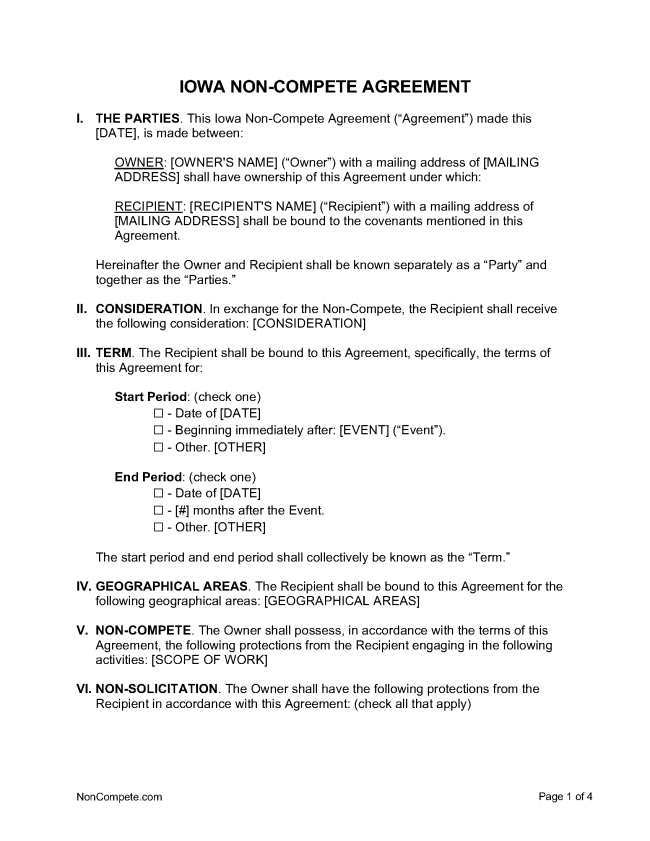An Iowa non-compete agreement is a term or set of terms found in a contract for employment or the sale of a business. The deal limits the kinds of work that an employee or group of employees can do after leaving a company to protect that company.
If disputed, Iowa courts typically look closely at non-compete agreements before enforcing them and have not enforced a non-compete agreement lasting longer than five years.
Table of Contents |
Are Non-Competes Enforceable in Iowa?
Yes, so long as they are:
- Reasonably necessary for the protection of the employer’s business;
- Not unreasonably restrictive of employee’s rights;
- Not prejudicial to the public interest.
Lamp v. American Prosthetics, Inc. (1986)
Sale of Business vs. Employment Contract
The factors a court considers in deciding whether a non-compete agreement is enforceable are the same whether the deal is part of the sale of a business or an employment contract. But agreements ancillary to the sale of a company are viewed more favorably and are generally allowed to have more substantial restraints. (Sutton v. Iowa Trenchless (2011))
Protection of Business
Courts are more likely to enforce a non-compete agreement against an employee who
- Worked near customers, or
- Gained information through working that would make it easier to lure customers away.
Iowa Glass Depot, Inc. v. Jindrich (1983)
Courts will not enforce a non-compete agreement that prohibits an employee from using general skills or knowledge, even if the employee acquired them through experience or job instruction. However, special training or knowledge that would allow a former employee to profit at the former employer’s expense can be a reason to enforce a non-compete. (Dain Bosworth Inc. v. Brandhorst (1984))
Restrictions on Employee
In considering whether a non-compete agreement unreasonably restricts an employee’s rights, courts primarily focus on how long the contract lasts and how big an area it covers, rather than the economic impact on the employee. (Curtis 1000, Inc. v. Youngblade (1995)).
Prohibited Professions
Attorneys can’t enter non-compete agreements contained in employment contracts or partnership agreements, except for certain limitations in agreements concerning retirement benefits. Rule 32:5.6(a), Iowa Rules of Professional Conduct.
Attorneys cannot enter case settlements that limit their right to practice in the future. Rule 32:5.6(b), Iowa Rules of Professional Conduct.
Physicians, however, are permitted to enter non-competes. (Pathology Consultants v. Gratton (1984)).
Terminating an Employee
Terminating an employee does not make a non-compete agreement unenforceable, but it does make it less likely when considered alongside other factors, that a court will enforce the agreement. (Ma & Pa Inc. v. Kelly (1984)).
Burden of Proof
The employer has the burden of proving that a non-compete agreement is reasonable. (Iowa Glass Depot, Inc. v. Jindrich (1983)).
However, once a party has shown that an agreement is reasonable, the other party has the burden of proving that the agreement should not be enforced because of misconduct or because the agreement violates public policy. (Cogley Clinic v. Martini (1962))
Continued Employment (consideration)
Continued employment, even indefinitely, is sufficient consideration to enforce a non-compete agreement. (Phone Connection, Inc. v. Harbst (1992))
Maximum Term
There is no clearly defined maximum term. When challenged, numerous non-compete agreements lasting two to three years have been upheld. Courts have not enforced restraint lasting longer than five years. (Rasmussen Heating & Cooling v. Idso (1990)).
Blue Penciling (allowed)
Iowa courts can modify non-compete agreements to make them no more restrictive than necessary and thus enforceable. (Ehlers v. Iowa Warehouse Company (1971))
